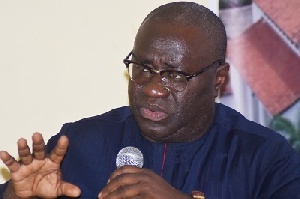- Home - News
- Elections 2024
- News Archive
- Crime & Punishment
- Politics
- Regional
- Editorial
- Health
- Ghanaians Abroad
- Tabloid
- Africa
- Religion
- Photo Archives
- Press Release
General News of Wednesday, 9 April 2025
Source: www.ghanawebbers.com
‘Letting those who pose existential threats walk free is invitation to criminal networks’ – Prof Aning
Security analyst Prof. Kwesi Aning has cautioned Ghanaian authorities that failure to prosecute foreign nationals involved in activities that threaten the state could embolden transnational criminal networks and weaken the country’s national security efforts.
Speaking on Joy News’ PM Express on Tuesday, April 8, Prof. Aning criticized what he described as the state’s reluctance to enforce its laws, especially in the fight against illegal mining and foreign-led criminal operations.
“It’s not going to work,” he said. “When you give a free pass to foreigners who commit existential threats to your state and let them go without prosecution, you’re cutting your nose to spite your face.”
Prof. Aning highlighted the state’s inaction on key legislative frameworks, particularly the Minerals and Mining Act, 2006 (Act 703), and its amendment, Act 995 of 2009. He argued that the absence of rigorous enforcement leaves Ghana vulnerable to exploitation by sophisticated criminal entities.
His comments come as the government renews its focus on the fight against illegal mining, also known as *galamsey*, which has not only devastated the environment but has also drawn the involvement of foreign actors and transnational networks.
Referring to President Mahama’s recent State of the Nation Address and a subsequent statement by the Lands Minister, Prof. Aning acknowledged that the government has recognized the threat. However, he stressed that urgency must translate into legal consequences.
“There’s a reason police commanders are being reshuffled,” he said. “But what good is urgency if it isn’t backed by consequence?”
He warned that Ghana risks becoming a hub for broader criminal activities such as illicit trade, money laundering, and terrorism financing if authorities fail to act decisively.
“When criminals realise there are no consequences, they build networks. And those networks become harder and harder to dismantle,” he warned. “This is how transnational threats are born—through local inaction.”
Calling for strong political will, Prof. Aning said the responsibility lies not only with law enforcement but with the entire political establishment.
“The laws are there. The danger is known. What’s left is the will to act. And time is running out,” he concluded.
Business










